Heinrich Convenes Second Bipartisan Senate AI Insight Forum Focused on Innovation
WASHINGTON – U.S. Senator Martin Heinrich (D-N.M.), Founder and Co-Chair of the Senate AI Caucus, hosted Congress’ second AI Insight Forum, bringing together a balanced, diverse, and bipartisan group of lawmakers and experts to discuss how Congress and the private sector can foster sustainable innovation around AI. Heinrich led the Forum with Majority Leader Chuck Schumer (D-N.Y.) and Senators Mike Rounds (R-S.D.) and Todd Young (R-Ind.).
Heinrich and his colleagues were joined by 21 top experts involved in the development and deployment of AI, including in sectors spanning tech, civil society, and labor.

CAPTION: U.S. Senators Martin Heinrich (D-N.M.), Mike Rounds (R-S.D.) Chuck Schumer (D-N.Y.), and Todd Young (R-Ind.) convene second bipartisan AI Insight Forum, Tuesday, October 24, 2023.
“If we want to maintain our nation’s leadership in this rapidly growing technology field, we need to think carefully and strategically about how we can unlock AI’s potential to drive innovation. That will include making sure there are sufficient guardrails in place to minimize AI’s risks. Strong public public-private sector collaboration is crucial to striking that balance, and our conversation today reaffirmed that,” said Heinrich.
Heinrich continued, “This will need to be a continuous process as these technologies evolve. But it’s clear that Congress can proactively lead on responsible AI development. This is the moment for us to shape the inputs that will deliver us the AI future we want.”
Senator Heinrich has already led successful bipartisan efforts on AI legislation.
In 2020, Heinrich helped usher the most significant advancements for AI ever secured. The FY21 National Defense Authorization Act included a modified version of my Artificial Intelligence Initiative Act (AI-IA), a comprehensive national strategy aimed at bolstering U.S. leadership in Artificial Intelligence (AI) research and development. This legislation also included the bipartisan National Artificial Intelligence Initiative Act to establish National AI Research Institutes at universities across the country.
Additionally, Heinrich helped pass the Artificial Intelligence for the Armed Forces Act to advance the Department of Defense’s AI capabilities. Heinrich also helped provide the Pentagon with enhanced hiring authorities to recruit more AI professionals and other personnel with computational skills relevant to military applications.
Heinrich also worked to establish the National AI Research Resource Task Force (NAIRR) to develop a detailed roadmap for the development of a national AI resource for AI research and convened a group of technical experts across academia, government, and industry to develop a detailed roadmap for how the United States can build, deploy, govern, and sustain a national research cloud and associated research resources.
A recommendation to establish the NAIRR came from the final report of the National Security Commission on AI, and work done by Stanford University’s Institute for Human-Centered Artificial Intelligence (HAI) significantly advanced the concept. This past January, the NAIRR Task Force released its final report with a roadmap for standing up a national research infrastructure that would broaden access to the resources essential to AI research and development.
In July, Heinrich introduced the CREATE AI Act, legislation that implements many of the recommendations of the NAIRR Task Force, providing AI researchers and students with greater access to the complex resources, data, and tools needed to develop safe and trustworthy artificial intelligence.
In September, Heinrich convened the first-ever bipartisan AI Insight Forum to help accelerate the committee process to build consensus around responsible AI policy.
This month, Heinrich joined acclaimed writer and producer George R.R. Martin and University of New Mexico Professor and Santa Fe Institute External Faculty Member Melanie Moses to explore the influence of artificial intelligence (AI) in arts and culture and its impact on New Mexico's creative economy. View a video of that event here.
Heinrich maintains a lead role on Leader Schumer’s bipartisan working group as the Senate takes steps toward comprehensive legislation to address emerging AI. Since June, the group has met every couple of weeks to strategize on policy solutions, particularly ahead of upcoming AI Insight Forums. These meetings have been very productive — enabling the Senators to engage in candid conversations about their respective interests and concerns.